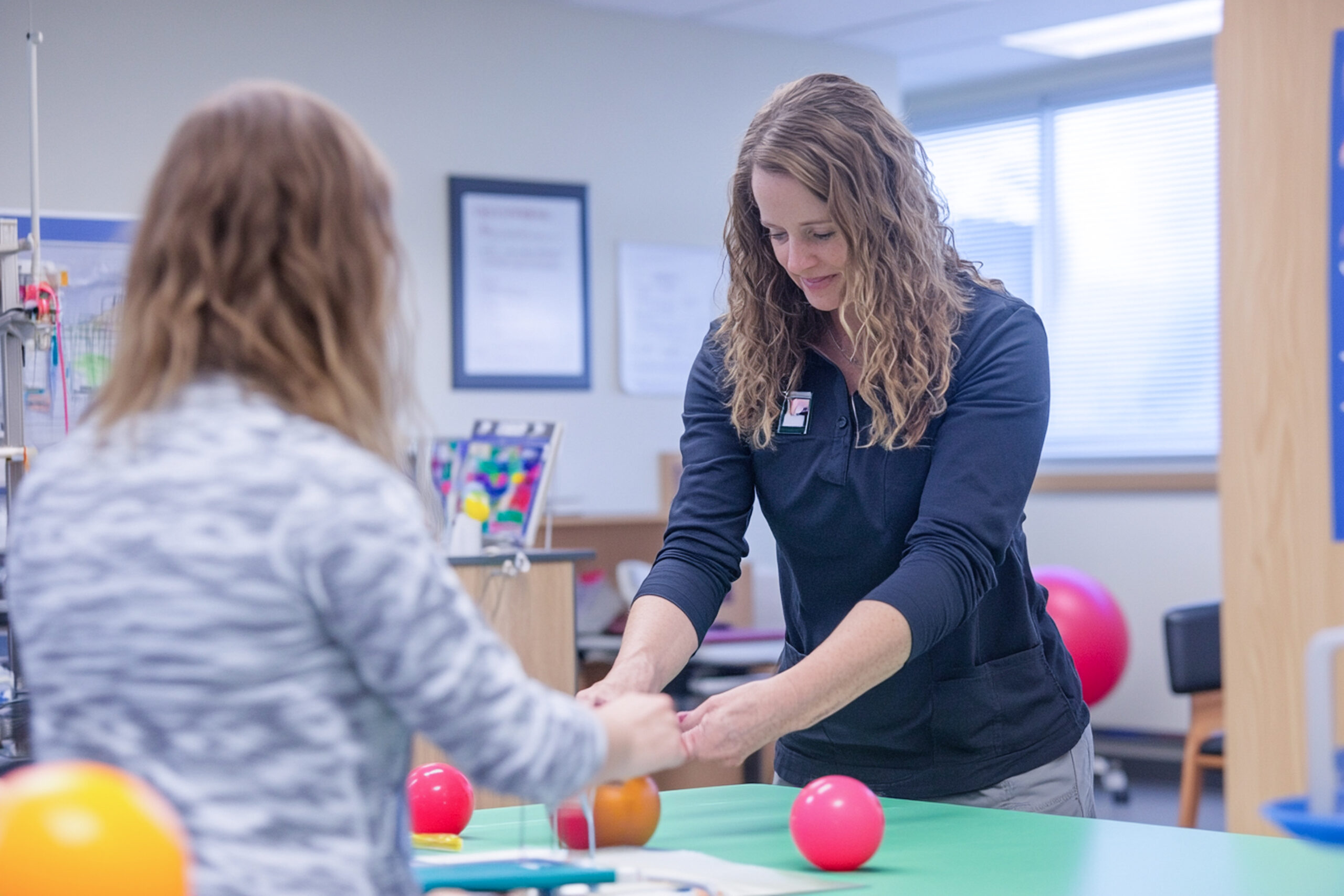Imagine being unable to perform tasks that most of us take for granted—dressing, preparing a meal, or engaging in meaningful work. Physical, cognitive, or emotional challenges make these everyday activities difficult for many people. This is where Occupational Therapists (OTs) step in. These skilled professionals empower individuals to regain or develop the skills needed to live fulfilling, independent lives.
Occupational Therapy is not just about rehabilitation; it’s about enabling people to participate fully in life. At Bloom Healthcare, we provide Occupational Therapy services tailored to each person’s unique goals and circumstances, ensuring meaningful and lasting outcomes.
What Is Occupational Therapy?
Occupational Therapy is a person-centred allied health discipline focused on helping individuals engage in meaningful activities—or “occupations”—that enhance their quality of life. These occupations can range from self-care and work to leisure and community participation.
Defining Occupational Therapy in Everyday Life
Occupational Therapists work with individuals of all ages to overcome physical, mental, or emotional barriers to independence. For example:
- A child with autism learns strategies to manage sensory overload in the classroom.
- A senior recovering from hip surgery regains confidence in walking safely around their home.
- A person with a disability gains the skills and tools needed to start a new job.
Core Principles of Occupational Therapy:
- Holistic Care: Addressing the physical, emotional, and social aspects of well-being.
- Individualised Interventions: Tailoring strategies to each person’s unique needs, preferences, and goals.
- Empowerment Through Action: Helping individuals take active steps toward greater independence and participation.
Who Can Benefit from Occupational Therapy?
Occupational Therapy is designed to support anyone facing barriers to daily activities. Common groups who benefit include:
- Individuals with Disabilities
People with physical, sensory, or intellectual disabilities often face challenges in navigating their environments. OTs provide adaptive tools, strategies, and therapies to help them engage meaningfully in their lives. - People Recovering From Illness or Injury
After an injury, surgery, or illness, tasks like dressing, cooking, or returning to work may feel overwhelming. OTs guide individuals through rehabilitation, helping them regain strength, mobility, and confidence. - Ageing Populations
Older adults may experience declining mobility, cognitive changes, or chronic conditions that impact their independence. OTs support ageing in place, recommending home modifications, assistive devices, and tailored exercises to enhance safety and function. - Children with Developmental Challenges
Children with delays in fine motor skills, sensory processing issues, or learning difficulties benefit from early intervention. OTs help children develop the skills they need to succeed at school, at home, and in their communities.
At Bloom Healthcare, our occupational therapy services are tailored to the diverse needs of these populations, ensuring that every client receives targeted, compassionate care.
Daily Responsibilities of an OT
Occupational Therapists play a multifaceted role in improving their clients’ lives. Their daily responsibilities often include:
- Conducting Assessments
OTs begin by evaluating their clients’ physical, cognitive, and emotional abilities. For instance, an OT working with a stroke survivor might assess hand strength, coordination, and the ability to perform basic tasks like brushing teeth. - Creating Personalised Intervention Plans
Based on the assessment, OTs design practical and achievable therapy plans. These might include exercises to improve fine motor skills, recommendations for assistive tools, or strategies to manage fatigue. - Teaching Skills for Daily Living
Helping clients master essential tasks, such as cooking, dressing, or using public transport, is a core part of occupational therapy. - Advocating for Clients
OTs often act as advocates, ensuring that schools, workplaces, or community settings provide appropriate accommodations for their clients. - Monitoring Progress and Adjusting Strategies
As clients achieve milestones or face new challenges, OTs adapt therapy plans to maintain progress and address evolving needs.
Specialisations Within Occupational Therapy
Occupational therapy is a diverse field with several areas of specialisation:
Paediatric OT
Focusing on children’s developmental needs, paediatric OTs help with sensory processing, motor skills, and school readiness.
Neurological Rehabilitation
OTs support individuals recovering from strokes, traumatic brain injuries, or neurological conditions like multiple sclerosis.
Mental Health
Addressing the psychological aspects of well-being, OTs help clients manage anxiety, depression, or behavioural challenges.
Hand Therapy
OTs specialising in hand therapy focus on recovering fine motor function after injuries or surgeries to the hand and wrist.
Workplace Ergonomics
By assessing and redesigning work environments, OTs reduce strain and improve productivity for individuals with workplace challenges.
OT in NDIS and Aged Care
Occupational Therapists are integral to the National Disability Insurance Scheme (NDIS) and aged care services, supporting individuals in achieving greater independence and well-being.
NDIS Support
For participants in the NDIS, OTs develop tailored plans to help them achieve their personal goals. This might include building skills, recommending assistive technology, or adapting environments for accessibility.
Aged Care
OTs help older adults remain independent and safe in their homes through mobility aids, home modifications, and therapies that enhance strength and coordination.
At Bloom Healthcare, our OTs are experienced in navigating NDIS and aged care frameworks, ensuring seamless, client-centred support.
How OTs Help With Independence and Quality of Life
Occupational Therapy transforms lives by addressing both immediate challenges and long-term goals.
Enhancing Functional Abilities
OTs help clients build the skills needed to complete daily tasks, from using utensils to managing finances.
Promoting Social Participation
Social isolation is a significant issue for many clients. OTs develop strategies to foster connection, whether through community engagement or leisure activities.
Building Confidence
Mastering new skills or regaining lost abilities boosts clients’ self-esteem and encourages greater independence.
Assessment Tools and Techniques Used by OTs
Occupational Therapists use a range of tools to evaluate their clients’ needs:
- Functional Capacity Evaluations: Assessing a person’s ability to perform essential tasks at work or home.
- Sensory Assessments: Identifying sensitivities to sensory input that may affect daily functioning.
- Cognitive and Emotional Evaluations: Understanding how mental processes and emotions influence an individual’s activities.
The Role of Technology in Modern Occupational Therapy
Technology is reshaping occupational therapy, offering innovative ways to support clients:
Adaptive Devices
From modified utensils to voice-activated home controls, adaptive tools enhance independence and convenience.
Digital Tools
Telehealth platforms and therapy apps provide new ways to deliver and monitor therapy, especially for clients in remote areas.
When to Seek Occupational Therapy Support
Consider consulting an OT if you or a loved one experiences:
- Difficulty performing daily tasks, such as dressing or eating.
- Challenges adapting to changes caused by injury, illness, or age.
- A need for modifications to home, school, or work environments.
Occupational Therapists play a pivotal role in helping individuals overcome barriers to independence, health, and happiness. By addressing physical, emotional, and environmental challenges, OTs empower people to live their best lives.
At Bloom Healthcare, our Occupational Therapists are dedicated to providing tailored, evidence-based care that transforms lives. Contact us today to learn how we can support you or your loved one.




